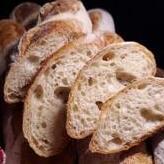-
Welcome to the eG Forums, a service of the eGullet Society for Culinary Arts & Letters. The Society is a 501(c)3 not-for-profit organization dedicated to the advancement of the culinary arts. These advertising-free forums are provided free of charge through donations from Society members. Anyone may read the forums, but to post you must create a free account.
Sourdough Bread Troubleshooting (Part 1)
-
Similar Content
-
- 22 replies
- 1,770 views
-
- 828 replies
- 189,827 views
-
- 719 replies
- 204,262 views
-
- 844 replies
- 242,155 views
-
- 3,854 replies
- 628,934 views
-
-
Recently Browsing 0 members
- No registered users viewing this page.




Recommended Posts